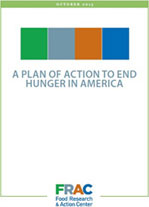FRAC Releases Report on Community Eligibility Participation in 2022–2023
This week, FRAC released its annual report, Community Eligibility: The Key to Hunger-Free Schools, School Year 2022–2023, detailing participation in the Community Eligibility Provision among schools and districts in all 50 states and the District of Columbia.
The 2022–2023 school year marked the end of the pandemic-related child nutrition waivers that allowed schools across the country to offer meals to all their students at no charge since spring 2020. By providing healthy free school meals for all, these waivers ensured that all children, no matter their household income, could reap the academic and health benefits of school breakfast. Despite a strong call for these waivers to be extended through the 2022–2023 school year, many schools were forced to return to the tiered system of certifying children for free, reduced-price, or paid meals.
As schools transitioned back to normal operations for the 2022–2023 school year, community eligibility has facilitated this transition by allowing schools in high-need areas to continue providing free meals to all students without needing to collect applications. As a result, we have seen significant growth in community eligibility participation, which shows the commitment schools across the country have shown to finding ways to continue serving meals to all their students free of charge.





